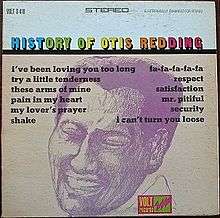The History of Otis Redding
The History of Otis Redding is the first of numerous compilations of Otis Redding songs, featuring hits from 1962 to early 1967. Released one month prior to Redding's death in December 1967, it was the final album (and only compilation album) issued during his lifetime.
| The History of Otis Redding | |
|---|---|
 | |
| Compilation album by | |
| Released | November 1967 |
| Genre | Deep soul Southern soul |
| Length | 31:35 |
| Label | Volt |
| Review scores | |
|---|---|
| Source | Rating |
| AllMusic | |
Track listing
| No. | Title | Writer(s) | Original album | Length |
|---|---|---|---|---|
| 1. | "I've Been Loving You Too Long" | Otis Redding/Jerry Butler | Otis Blue: Otis Redding Sings Soul | 2:49 |
| 2. | "Try a Little Tenderness" | Jimmy Campbell/Reg Connelly/Harry Woods | The Otis Redding Dictionary of Soul | 3:20 |
| 3. | "These Arms Of Mine" | Redding | Pain in My Heart | 2:30 |
| 4. | "Pain In My Heart" | Naomi Neville | Pain in My Heart | 2:22 |
| 5. | "My Lover's Prayer" | Redding | The Otis Redding Dictionary of Soul | 3:00 |
| 6. | "Fa-Fa-Fa-Fa-Fa (Sad Song)" | Otis Redding/Steve Cropper | The Otis Redding Dictionary of Soul | 2:37 |
| No. | Title | Writer(s) | Original album | Length |
|---|---|---|---|---|
| 7. | "Respect" | Redding | Otis Blue: Otis Redding Sings Soul | 2:06 |
| 8. | "Satisfaction" | Jagger/Richards | Otis Blue: Otis Redding Sings Soul | 2:43 |
| 9. | "Mr. Pitiful" | Otis Redding/Steve Cropper | The Great Otis Redding Sings Soul Ballads | 2:28 |
| 10. | "Security" | Redding | Pain in My Heart | 2:30 |
| 11. | "I Can't Turn You Loose" | Redding | Volt single 130 | 2:35 |
| 12. | "Shake" | Sam Cooke | Otis Blue: Otis Redding Sings Soul | 2:35 |
gollark: Er, still is.
gollark: Anyway, the long and short of it is that your bunker was really ineffective as a bunker.
gollark: Oh, and the PotatOS for OpenComputers installation on the main computer makes it more weird-mess-ish.
gollark: And the unlabelled buttons tied to important parts of the security system I stuck on random wall panels.
gollark: Also, the self-destruct function rigged to the dead-man's switch in my base, that's relevant too.
References
This article is issued from Wikipedia. The text is licensed under Creative Commons - Attribution - Sharealike. Additional terms may apply for the media files.